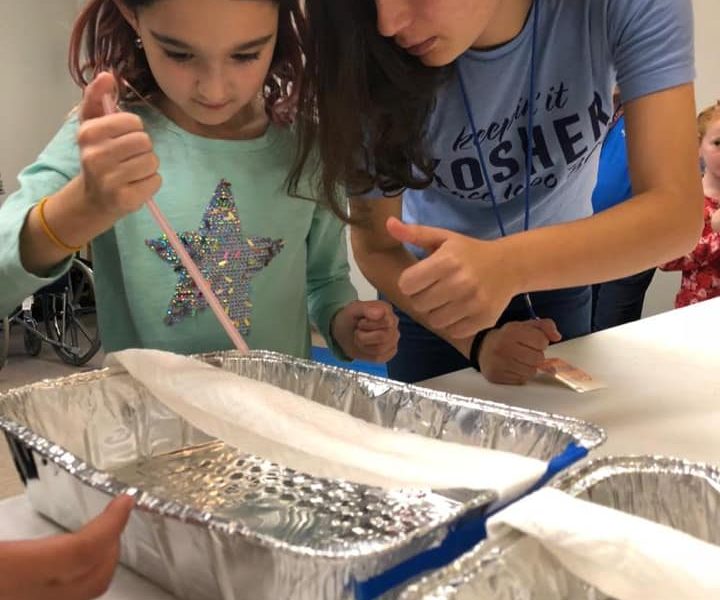Danielle V. Minson — Raising the Bar

Jewish Federation’s Israel Engagement Will Look Different in 2021
The Israel and Overseas committee at the Jewish Federation of Cincinnati is making some major changes to Israel programming due to the COVID-19 pandemic.
Historically, Israel and Overseas (I&O) would support a community shaliach (emissary) and the Chaverim M’Israel (young emissaries) programs to help create personal connections to Israel in our community. But with limitations around travel and live programming due to COVID-19, the Federation has made the difficult decision to suspend those programs.
“Much of the work of our community emissaries, and particularly our chaverim, depends upon face-to-face gatherings, which are not safe during COVID,” said Jan Evans, Director of Strategic Impact. “Schools, for instance, have needed to suspend outside educators from coming into their classrooms.”
In a typical year, the senior emissary works with the entire community to help educate about Israel through programming, individual connections, and engagement opportunities. “They have the background and the knowledge to be able to put together really interesting and exciting programs for our community,” Evans said. “And where the shlichim tend to engage in more adult programming, the chaverim focus primarily on younger people.”
Chaverim M’ISrael is a gap year program for Israeli students. Instead of going directly into the International Defense Force, students can take part in this prestigious program. “There is an application process and a very intensive interview process,” Evans said. “Only the cream of the crop are selected. These kids are leaders, they’re smart, and they’re outgoing.”
“Like the shlichim, they are supposed to be Israel advocates for their community, primarily for their peer group and younger children,” Evans continued. The chaverim travel to both Jewish day schools and camps, as well as public and private schools in Greater Cincinnati, bringing Israeli culture into each classroom or program in fun and engaging ways.
It was an incredibly difficult decision to suspend the programs, said Jewish Federation President Debbie Brant. “The Federation has made sacrifices and will continue to do so. We’ve had to cut these beloved programs, along with signature events, so we can redirect those dollars to fill immediate needs.”
The I&O Committee was already in the process of being restructured to help create new, stronger connections with Israel, but the timing of the COVID-19 lockdowns accelerated those changes.
A part of the restructuring process is folding the current Partnership2Gether (P2G) program into the rest of the Federation’s Israel activity. “A P2G task force was developed,” said I&O Vice President Gary Greenberg. “It was determined the focus of P2G should be broadened beyond our partner city Netanya, and have its mission better aligned with Federation purpose and strategy.”
Greenberg said that decision, coupled with the decision not to have an emissary this year, made it clear that the Federation and the community would benefit from combining all of Federation’s Israel-related activity into the I&O committee.
Virtual programming will be a major component of I&O’s new engagement plan, Greenberg said. “We are looking to put together virtual affinity groups between Cincinnati and Israel. This could be lawyers to lawyers, millennials to millennials, or parents to parents. The groups can talk about how they’re handling the challenges around COVID-19 from an epidemiological perspective, how young adults are handling the challenges of school and starting careers, or how parents are juggling working from home and taking care of their families.”
National organizations such as The Jewish Agency for Israel (JAFI) and the Jewish Federations of North America (JFNA) are putting together virtual resources and programming that will be made available to our community through our calendar of events. “JAFI is also creating a Global Shlichim Network,” Evans said. “This Gateway to Israel Engagement program will give Jewish professionals access content to support Israel engagement, programming, and education.”
In addition to using national programming, I&O will also call on Israelis, both overseas and living in Cincinnati, to participate in and lead programming to get them more deeply engaged in our community.
“Fortunately, we have Noga Maliniak, who is a former emissary,” Evans said. “She works for the Federation part-time as an Israel Representative, and is working very closely with our sub-committees to help us come up with programming. She’s introducing us to interesting groups of people who would connect well with people in Cincinnati. She’s really helping us fill this hole.”
Evans went on to say filling the role of the chaverim is a little more difficult. With many schools switching to virtual attendance, Evans said they thought about creating a virtual chaverim program, but it was ultimately decided that doing so would add another level of complexity to an already stressful year for teachers and students. “As we think about programming and engagement opportunities, we are keeping in mind activities for that age group.”
Many of the former chaverim want to stay engaged with Jewish Cincinnati by creating video messages to the community. Also, I&O will explore local and national programming opportunities for students and families in Cincinnati.
With all of these changes, Evans and Brant want to make it clear that Israel education and allocation is not becoming a back-burner issue for the Federation. “This is not a decision to make Israel less of a priority for the organization,” Brant said. “Instead, it’s a decision to create engagement in other ways in a year where it’s not possible to hold in-person gatherings.”
“We are cautiously optimistic the shaliach and chaverim will be back next year,” Evans said. “In fact, interviews are set to begin very soon. Of course, no one knows what the pandemic will look like next August, but we are hoping for the best.”

